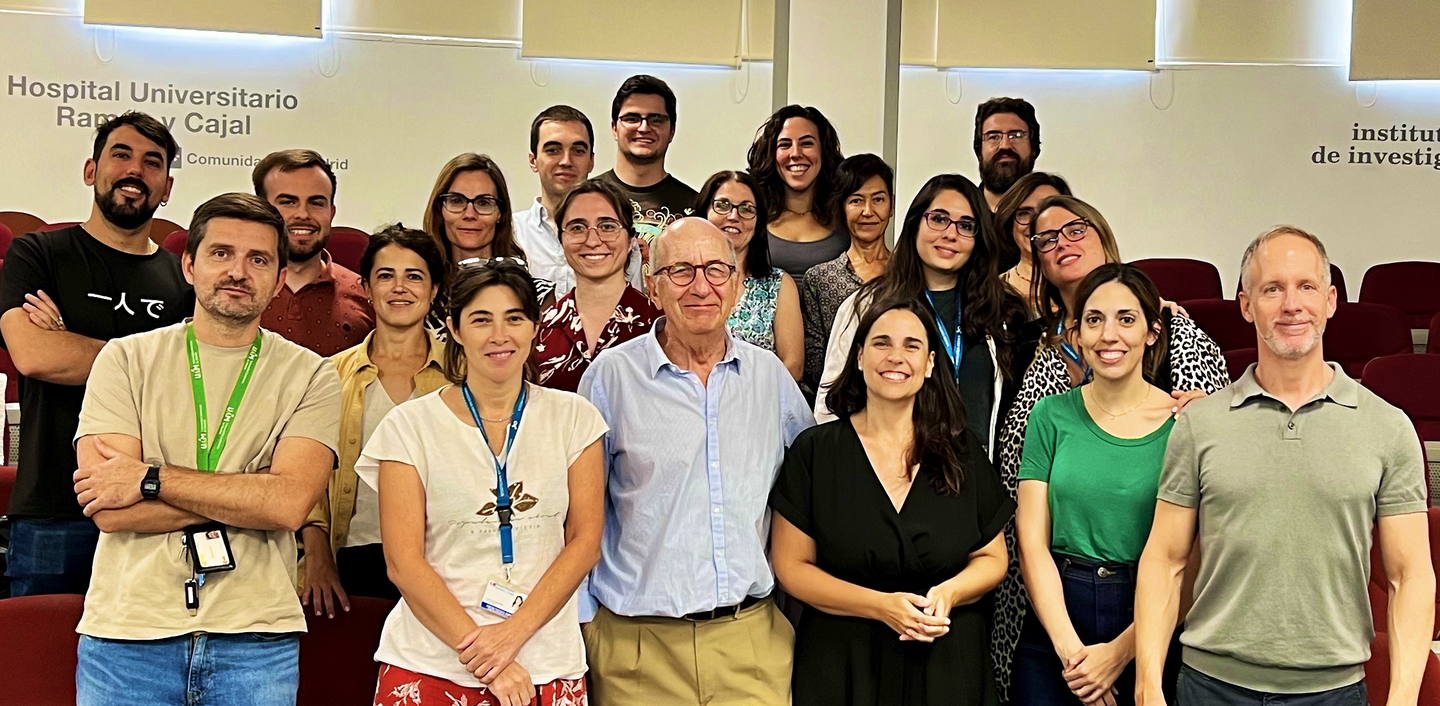Biomarkers and Personalized Approach to Cancer Group (BioPAC)
Group leader
Bruno Sainz Anding
Tlf.: + 34 91 497 54 20
Principal Investigator
- María Isabel Sánchez Pérez
- Julie Earl
- Alfredo Carrato Mena
- María Ángeles Vaz Salgado
Collaborating Staff
- Sonia Alcalá Sánchez
- Diego Navarro Vera
- Laura Ruiz Cañas
- Juan Carlos López Gil
- Jorge Melones Herrero
- María Reyes Ferreiro Monteagudo
- Federico Longo Muñoz
- Mercedes Rodríguez Garrote
- Jorge Juan Villalón López
- Patricia Delgado Aliseda
- María del Carmen Calés Bourdet
- Iker Rodríguez Arabaolaza
- Marta Pardo García
- Sandra Batres Ramos

Principal Investigator
- María Isabel Sánchez Pérez
- Julie Earl
- Alfredo Carrato Mena
- María Ángeles Vaz Salgado
Collaborating Staff
- Sonia Alcalá Sánchez
- Diego Navarro Vera
- Laura Ruiz Cañas
- Juan Carlos López Gil
- Jorge Melones Herrero
- María Reyes Ferreiro Monteagudo
- Federico Longo Muñoz
- Mercedes Rodríguez Garrote
- Jorge Juan Villalón López
- Patricia Delgado Aliseda
- María del Carmen Calés Bourdet
- Iker Rodríguez Arabaolaza
- Marta Pardo García
- Sandra Batres Ramos
Strategic objectives
- Develop new technologies and systems for personalized medicine, focused on the identification of drugs selected based on specific tumor characteristics, biomarkers, and/or cancer stem cells as a universal target for aggressive tumors.
- Actively participate in national and international networks and projects in the area of cancer, with a focus on tumor biology, cancer stem cells, the immune tumor microenvironment, and pre-clinical cancer models such as patient-derived xenografts (PDX).
- Strengthen national and international partnerships and collaborations between the business sector, academia and the public health sector.
- Promote scientific and technological excellence on a European scale by creating a fundamental reference framework in cancer-based studies.
Research lines
- Identification and characterization of new biomarkers for the early detection of cancer, response to therapy and detection of cancer stem cells in different solid tumors.
- Development of liquid biopsy platforms for the isolation/characterization of circulating cancer (stem) cells and/or circulating free tumor DNA as a marker for early detection of cancer.
- Management of the National Registry of Familial Pancreatic Cancer (PanGen-Fam), with a biobank of samples and associated clinical data for phenotypic and molecular characterization of families.
- Management of the screening program for high-risk individuals and development of new techniques and image analysis approaches (e.g., radiomics) for early detection.
- Identification of new genes, pathways and/or variants (i.e., potentially pathogenic mutations) associated with cancer risk (e.g., pancreatic, gastric, colorectal, glioblastoma and oligodendrogliomas) using omics approaches, and their exploitation in personalized medicine. Study of the deregulation of gene expression in the aforementioned tumors.
- Characterization of the cellular niche and tumor microenvironment, with special attention to immune cell infiltrates such as tumor-associated macrophages (TAMs).
- Development of new biomodels and in vitro and in vivo platforms to test and discover new therapies, such as metallocomplexes, nanotechnologies, siRNAs and anti-CSC agents. Promote the translation of new therapies to the clinic and participate in clinical trials with a translational component.
Location
Faculty of Medicine
Laboratory B17
Department of Biochemistry-Faculty of Medicine
Sols-Morreale Biomedical Research Institute
Madrid Autonomous University
+34 91 497 54 20
Keywords
cancer stem cells, biomarkers, liquid biopsy, circulating free tumor DNA, National Registry of Familial Pancreatic Cancer, pancreatic ductal adenocarcinoma, gastric cancer, colorectal cancer, glioblastoma, oligodendrogliomas, sarcomas, tumor microenvironment, tumor-associated macrophages, chemoresistance, mitochondrial respiration
